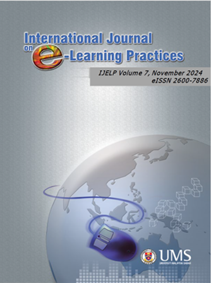THE PERCEPTIONS OF SMK PEREMPUAN LIKAS STUDENTS ON THE IMPACT OF SOCIAL MEDIA ON LANGUAGE LEARNING
DOI:
https://doi.org/10.51200/ijelp.v7i1.5447Keywords:
ESL Learning, Social media, Perceptions, English language learningAbstract
The study investigates the perceptions of SMK Perempuan Likas students on the impact of social media on their language learning and the challenges they encounter when using social media as a tool for language learning. This study employed a mixed-methods approach, where 100 Form 4 students were involved in completing the questionnaires and a total of 5 students participating in focus group discussion. The quantitative data were analysed using SPSS to provide descriptive statistics, while the qualitative data were subjected to thematic analysis. Quantitative results indicated majority of students (56%) have a positive perception of the impact of social media on their English language skills, with another 42% acknowledging some beneficial effects, and only 1% reporting a negative impact. Students reported the most enhanced skills through social media as speaking (25%) and reading (20%), followed by pronunciation and communication (15% each), listening and spelling (9% each), and writing (7%). Qualitative findings reveal several challenges, including difficulties understanding abbreviations, pronunciation, and complex phrases. Participants also highlighted negative aspects of social media such as distractions, exposure to inappropriate content, and the potential for bullying.The findings suggest that educators should develop strategies to leverage social media’s benefits and mitigate its challenges. Policymakers are encouraged to implement digital literacy programs to help students navigate social media effectively. This balanced approach aims to maximise the positive impacts of social media on language learning while minimising its challenges. The study contributes to the growing body of literature on digital learning tools and provides practical recommendations for educators and policymakers.
References
Al Jahromi, D. (2020). A quantitative study of the perceived impact of social media networks on Bahraini users’ English language learning. The Journal of Teaching English with Technology, 20(4), 23–40.
Haque, Md. Z. (2023). The use of social media platforms in language learning: A critical study. Journal of Global Research in Education and Social Science, 17(1). https://doi.org/10.56557/JOGRESS/2023/v17i18109
Md Yunus, M., Zakaria, S., & Suliman, A. (2019). The potential use of social media on Malaysian primary students to improve writing. International Journal of Education and Practice, 7(4), 450–458. https://doi.org/10.18488/journal.61.2019.74.450.458
Safitri, M., Yuliyani, A., Hamid, F., & Suriaman, A. (2022). The use of social media for learning English: Students’ perspective. Indonesian EFL Journal, 8(2), 269–276.
Sathiyaseelan, T. (2021). The impact of social media on secondary school students’ English language performance in Malaysia - UTAR Institutional Repository [Final year Project]. University Tunku Abdul Rahman.
Sha, S., & Pathan, H. (2018). The social media and English language. Journal of Literature, Languages and Linguistics, 47, 25–28. https://www.semanticscholar.org/paper/The- Social-Media-and-English-Language-Sha- Pathan/1932d1cdcedfe5aff6f39d5504d025a90d5e8852
Western Governors University. (2022). Connectivism learning theory. Retrieved from https://www.wgu.edu/blog/connectivism-learning-theory2105.html#:~:text=Connectivism%20is%20a%20relatively%20new,make%20choices%20about%20our%20learning
Yarychev, N., & Мentsiev, А. У. (2020). Impact of digital education on traditional education. Journal of Physics: Conference Series, 1691(1), 012132. https://doi.org/10.1088/1742-6596/1691/1/012132
Zheng, X., Ismail, S. M., & Heydarnejad, T. (2023). Social media and psychology of language learning: The role of telegram-based instruction on academic buoyancy, academic emotion regulation, foreign language anxiety, and English achievement. Heliyon, 9(5), e15830. https://doi.org/10.1016/j.heliyon.2023.e15830






